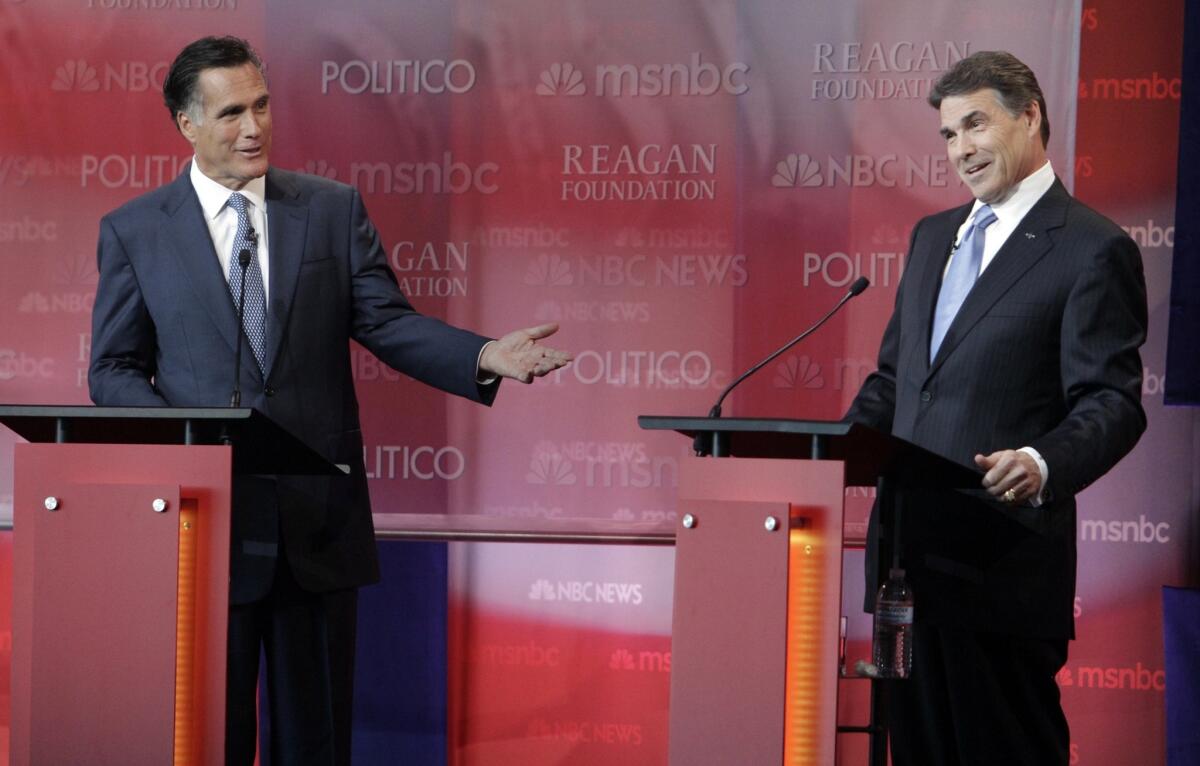Analysis: Republicans aim at presidential debates but miss target

After losing the popular vote in five of the last six presidential races, Republicans commissioned a study to determine what, exactly, was ailing the Grand Old Party and concluded, among others things, the problem was too much free speech.
Specifically, the so-called autopsy report released in the winter of 2013 concluded that there were too many debates during the last Republican primary season, a blur of gotcha, gaffes and slashing one-liners that left Mitt Romney badly bloodied by the time he finally won the nomination.
To remedy this, the Republican National Committee, meeting this week in Memphis, decided to clamp down ahead of the 2016 campaign. A group of 13 committee members will decide the timing and location of debates and choose the questioners, with an eye at limiting the number of sessions and softening the queries put to the party’s White House contenders.
A case could be made that there were too many debates in 2012 — 20 of them, including a pair in New Hampshire less than 12 hours apart — but part of that would be pure selfishness on the part of those forced to watch each and every one. The sessions grew mind-numbingly repetitive, as candidates vocalized the same well-worn lines and iterated the same policy positions, over and over. Sometimes the only variety was the candidates’ positioning on stage — some pushed to the center, others shoved to the wings — based on their prominence in the latest opinion survey.
But there is a fundamental flaw at the heart of Republicans’ remediation effort: It’s not debates that hurt a party’s nominee. It’s what the candidates onstage are saying during the debates.
To think otherwise is akin to blaming a sports car for speeding or a tall tree if a child falls and hurts himself.
Debates are the rare opportunity in a campaign when candidates are forced to directly engage their opponents, defend themselves and their ideas, and answer questions they might otherwise choose to ignore. That’s why the media devote such extensive coverage and voters pay such close attention.
Yes, there is a great deal of theatricality involved, and not just by the TV networks hyping their programs and the evening’s spotlighted host.
But setting staginess aside, debates offer candidates an important chance to contrast themselves and demonstrate why they are different and, presumably, better than their opponents. A strong performance, especially by a lesser-known contender, can instantly transform the race. Witness the brief boomlets in 2011 surrounding Michele Bachmann and Herman Cain.
Debates — like elections — are also a competition, and there is every incentive for candidates to try to cut down the opposition (usually after making nice in the preliminary rounds, when the contestants are typically on their very best behavior). That is why former Utah Gov. Jon Huntsman aimed at Romney’s reputed wishy-washiness with his withering depiction of a “perfectly lubricated weather vane.” Why Texas Gov. Rick Perry assailed the alleged predations of Romney’s Bain Capital and introduced “vulture capitalism” into the vernacular of the campaign. Why Newt Gingrich attacked Romney’s stance on immigration and mocked his infamous — and politically costly — advocacy of “self-deportation.”
It’s not just Republicans. Back in 1988, during a primary-season presidential debate, Tennessee Sen. Al Gore raised the issue of weekend furloughs for convicted killers under Massachusetts Gov. Michael Dukakis. The issue gained little traction in the Democratic race but, hammered by Republicans in the fall, helped destroy Dukakis’ White House hopes.
In 2008, Democrats had more than 20 debates, and rivals Hillary Rodham Clinton and Barack Obama gave no quarter. Clinton, among other things, attacked her rival’s vision for healthcare reform and his “elitist” attitude, questioned Obama’s preparedness for the White House and even seized on his relationship with the incendiary Rev. Jeremiah Wright to question his electability.
Obama won the nomination and the White House anyway.
If the political parties wanted to avoid their candidates ever saying anything potentially damaging about their primary opponents, they could hand out muzzles. Or they could cancel all the debates and have candidates simply exchange written policy papers.
Then they could stand back and watch as even fewer people pay attention.
More to Read
Sign up for Essential California
The most important California stories and recommendations in your inbox every morning.
You may occasionally receive promotional content from the Los Angeles Times.











